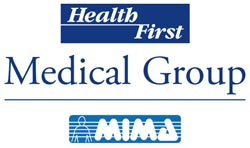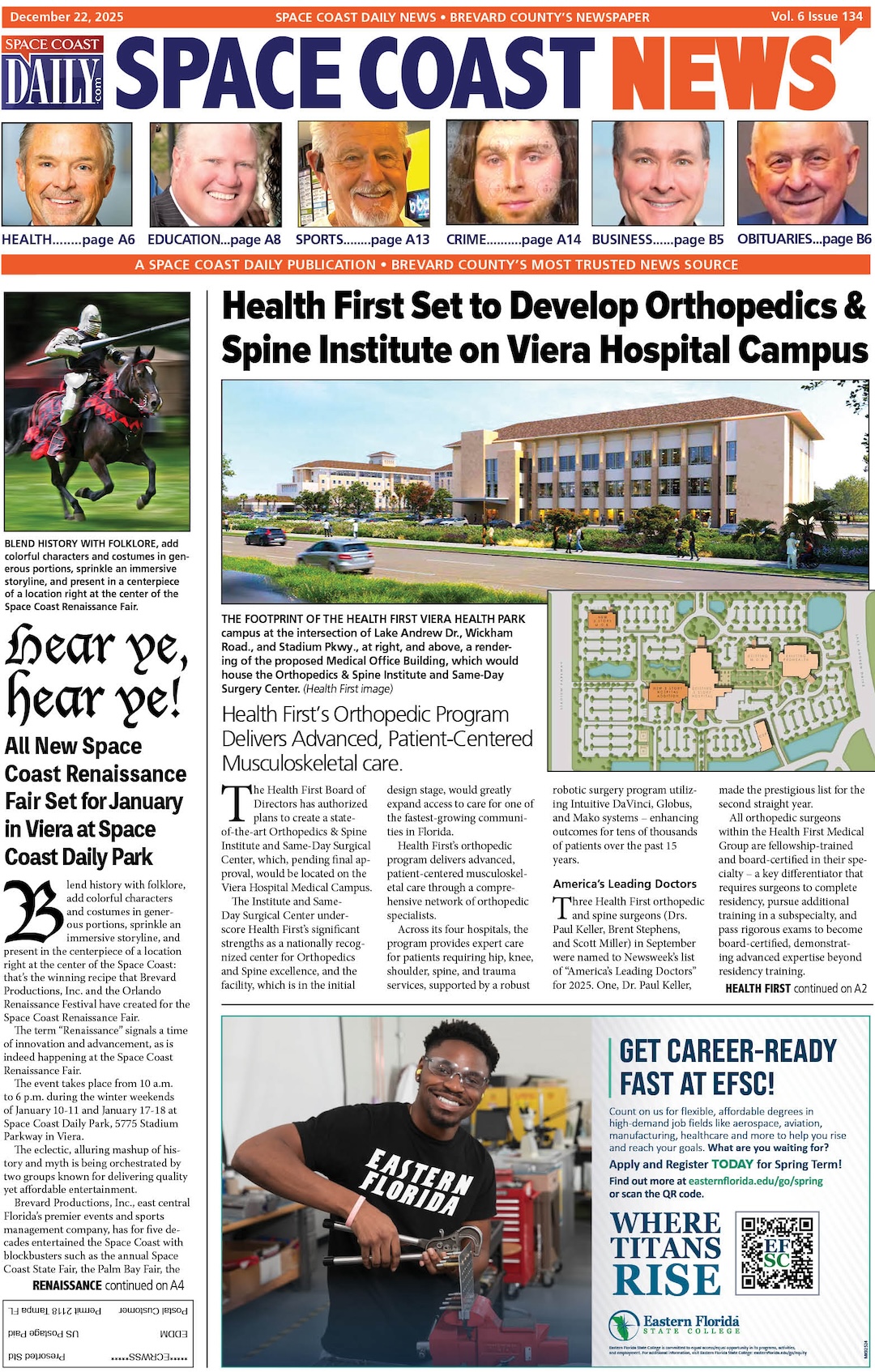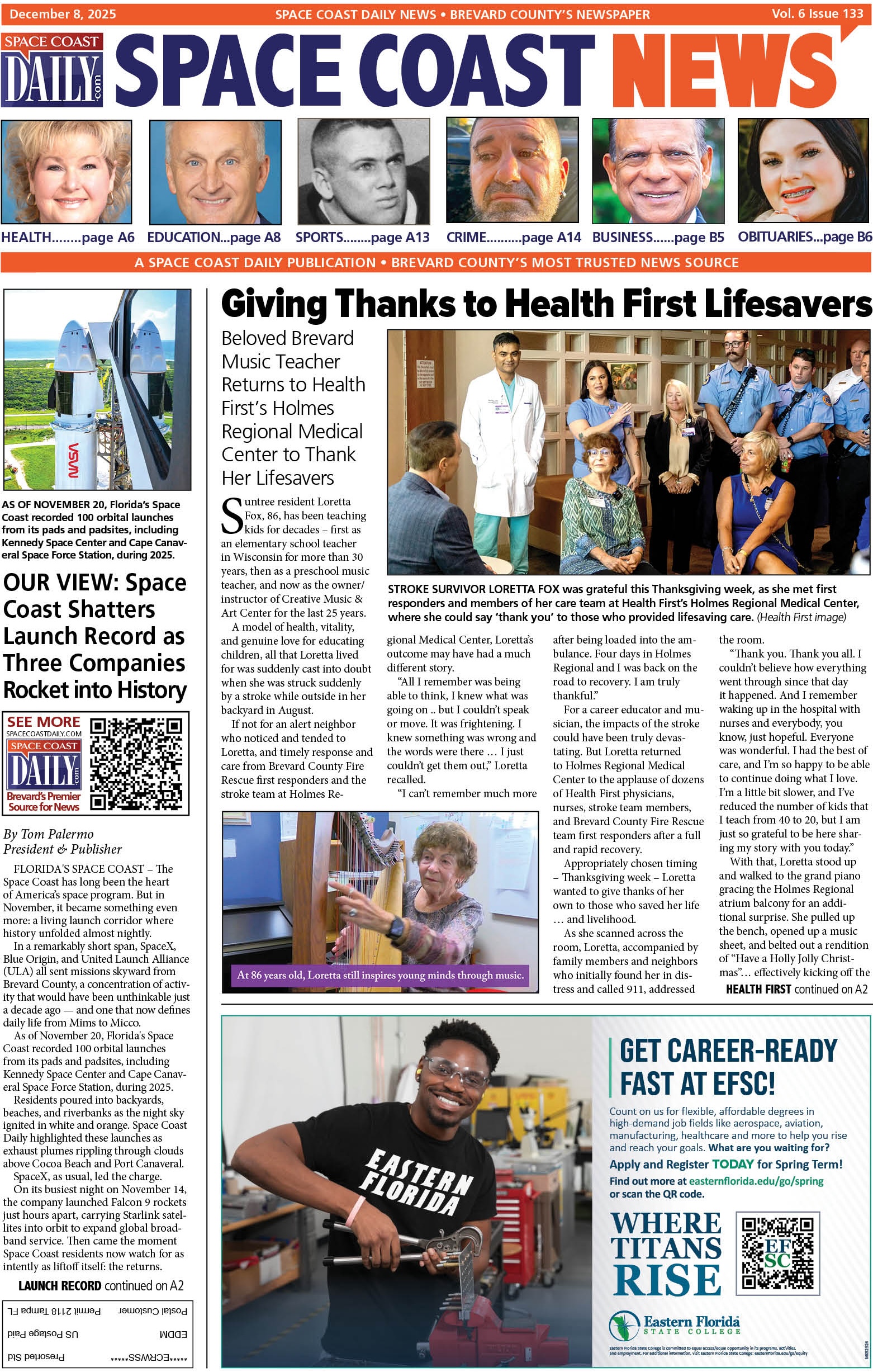YEAR IN REVIEW: 2013 Healthcare Highlights
By Dr. James Palermo // December 31, 2013
OBAMACARE DOMINATES HEALTHCARE NEWS
BREVARD COUNTY, FLORIDA – Over the past year we have covered a multitude of healthcare topics and issues with the intent to provide interesting and useful information to keep you up to date on the ever changing healthcare landscape and help you make decisions for yourself and family that optimize your health and well-being.

As the end of 2013 approaches, we take a look back at the biggest stories and issues of the year that impact us as consumers of care and those who care for us.
ACA DOMINATES HEALTHCARE AND POLITICAL HEADLINES
The issues surrounding the Affordable Care Act (ACA, aka Obamacare) have dominated the headlines across the nation’s media outlets. Forty-two major healthcare articles covering topics ranging from the states’ legislative approach to Medicaid expansion, to the endless trials and tribulation plaguing the implementation of the healthcare law, to President Obama’s broken promise that people could keep health plans if they liked them were posted to SpaceCoastDaily.com in 2013.
No Medicaid Expansion…Now What?
In mid-February, when Florida Governor Rick Scott made the surprising announcement that he would support one of the key elements of the ACA—expansion of Medicaid (MA) healthcare coverage to approximately 900 thousand uninsured Floridians—hopes rose among the strong proponents of MA expansion, which notably included Democrats, the Florida Hospital Association and the Florida Chamber of Commerce, that there might be a chance that the legislature would approve MA expansion during the 2013 legislative session.

However, for a variety of complex and controversial reasons, and “no-confidence” in the reliability and stability of the federal economy, both the Florida House and Senate Select Committees on the ACA ultimately voted, along party lines, not to approve expansion of the MA program as prescribed in the ACA.
Although the Florida legislature rejected MA expansion, the body initially left room for a possible compromise involving placing qualified low-income Floridians into private insurance plans. Unfortunately, legislators could not find the common ground to approve such an alternative plan. Whether or not MA expansion will be revisited in the 2014 legislative session remains to be seen.
Obama Delays ACA Employer Mandate For One Year
Following complaints from the private sector related to employer concerns about the complexity of data reporting requirements associated with the employer mandate, the Obama administration delayed implementing this key component of the ACA for a year. That unilateral, non-legislative decision was made in July.

With the implementation of the employer mandate, which penalizes employers with more than 50 employees if they fail to provide a minimum standard of affordable health insurance, only three months away from the October 1st enrollment start date, small businesses throughout the nation had been making final strategic decisions on how to reduce the working hours of their employees so fewer employees qualify for the mandated, employer-provided health insurance.
At the time, the one year reprieve, which pushed the mandate out to January 1, 2015, not only allowed the administration time to alleviate concerns among business owners, but also took a controversial component of the law off the table before the midterm elections in 2014. However, it is projected by many experts that millions more Americans will ultimately be losing employer provided healthcare coverage that they liked and met their needs, adding to the political fallout from Obamacare reality.
Obamacare HIX Plans Limit Choice of Doctors, Hospitals
Americans shopping for health insurance on the ACA health insurance exchange (HIX) marketplaces are, much to their chagrin, discovering that the available plans on the HIX may restrict the choice of doctors and hospitals in order to keep premiums low and “affordable.” The Obamacare implementation revelations that HIX consumers may well not be able to keep their policy or their doctor if they like them, have not instilled in Americans a great deal of confidence in the law or trust in the President.

Plans that offer limited provider networks typically offer lower premiums because they have either excluded the most expensive providers or insurers have negotiated discounts with participating providers in exchange for routing them more volumes.
Many HIX shoppers may have fewer hospitals and doctors to choose from than with their previous coverage or coverage through their employers not only because insurers are restricting provider panels, but also because some providers are balking at being in exchange networks due to low reimbursement rates or are concerned that the exchanges could be dominated by sick people who won’t be able to pay their portion of the bills.
On October 1, we reported that the launch of Healthcare.gov, the website for consumers shopping for health insurance on the Obamacare online health insurance exchange marketplaces, was very rocky, with multiple reports of technical difficulties in states across the country.
At that time the administration claimed that these “glitches” that consumers were encountering should be corrected “very soon,” and, President Obama said, “In the first week, first month, first three months, I would suspect that there will be glitches.”

Over the past 3 months there has been a plethora of accountability finger-pointing, multiple enrollment deadline extensions and mandate exemptions, and what now appears to be at least some degree of productive website functionality just before the mandate component of the law kicks in on Jan. 1.
The Obama administration announced that more than 1.1 million people enrolled in health care coverage through the federal marketplace between October 1 and December 24, with the vast majority of those accessing the system as the website became more functional in mid-late December as the coverage cutoff for Jan. 1 (which was Dec. 24) rapidly approached.
The questions that have not been answered are how many of the 1.1 million who have signed up have actually chosen a plan and paid the first premium, and how many are healthy (crucial demographic to support the cost of the unhealthy).
So far, the late surge in Obamacare sign-ups has not been enough to quiet critics concerned about affordable premiums, reliable coverage and overall program costs.
Many Americans’ Insurance Canceled Due To Obamacare
At the end of October with the abject failure of the health insurance exchange website center stage since its attempted launch, the law garnered wide spread coverage for something unrelated to troubles with its online insurance marketplace.
Millions of Americans were notified that the health insurance policies with which they were satisfied would be canceled primarily because their policies did not cover the essential benefits required under Obamacare.

In 2009, President Obama promised, “If you like your health plan, you will be able to keep your health plan,” and in 2012 was still saying, “If you already have health insurance, you will keep your health insurance.”
The President’s pledge was a primary selling point of his signature healthcare legislation, aimed at calming consumers who feared being forced to give up policies and providers they liked as the program expanded coverage to many of the nation’s 48 million uninsured.
Because it was reported that the administration actually knew what was in the law, President Obama’s credibility has been seriously impugned due to what appears to be a deliberate attempt to mislead the American people on an issue so critical to the acceptance of healthcare reform.
NON-OBAMACARE ISSUES IN THE 2013 HEALTHCARE NEWS
Health First Physicians, MIMA Merge
A new chapter in Brevard healthcare history unfolded in early 2013 when Health First finalized its acquisition of Melbourne Internal Medicine Associates, or MIMA, creating the Health First Medical Group, and more than doubled the number of Health First physicians from 120 to 250, including almost every medical specialty.

The new models of care, which are focused on quality, safety, effectiveness, efficiency and the ability to optimally manage populations over a continuum, require tightly integrated and aligned relationships between physicians and hospitals.
Physicians and healthcare systems working closely together with shared organizational strategies, goals and incentives should be mutually beneficial to patients and providers, and improve healthcare in our community.
Survey Shows a ‘Silent Exodus’ Of Physicians
More than 1,100 Florida physicians were part of the 13,557 survey responses in the Physicians Foundation Survey of American Physicians: Practice Patterns and Perspectives.

When asked about their feelings regarding the current state of the medical profession, over 73 percent described their feelings as negative; and when asked if they thought the medical profession was in decline, over 75 percent agreed that it was.
Physicians are leaving medicine en masse at the very moment when healthcare reform is poised to extend health insurance to some 30 million additional people. 67 percent of Florida physicians participating in the survey said that they were less positive about the direction and future of healthcare in America because of the passage of the Affordable Care Act.
AMA: It’s Official, Obesity Is A Disease
At its annual meeting in June, the American Medical Association’s governing House of Delegates voted overwhelmingly to recognize obesity as a disease state with multiple pathophysiology aspects requiring a range of interventions and setting the stage for physicians to be more aggressive at medically, or in appropriate cases surgically managing obesity.

The debate among the members was spirited. Some delegates argued that obesity is a result of lifestyle choice, not medical illness, and the disease designation would “medicalize a condition” that affects nearly thirty percent of the nation.
However, advocates for disease designation won out, arguing that the treatment and prevention of the myriad of obesity associated complications and conditions would improve and physician reimbursements for obesity-related care would be better defined and more consistent.
One Hopeful, One Tragic Outcome For PAM Victims
This summer two children, one in Arkansas and one in Florida, who after playing in water that was contaminated with the brain attacking Naegleria fowleri, an organism found naturally in freshwater lakes, rivers, ponds and hot springs in the United States, particularly in southern-tier states, developed the rare and deadly brain infection caused by N. fowleri known as primary amebic meningoencephalitis (PAM), aka the “brain-eating ameba.”

With the wide variety of popular recreational opportunities available in Florida’s freshwater, in which N. fowleri is ubiquitous, almost all of us are at risk.
However,according to the CDC, there have only been 31 reported infections in the U.S. in the 10 years from 2003 to 2012, despite hundreds of millions of recreational water exposures each year.
Nevertheless, take a few minutes to review the CDC’s recommended personal actions to reduce the risk of N. fowleri infection in this article.
23,000 Die Yearly of Antibiotic Resistant Infections
Antibiotics, powerful tools for fighting illness and disease, can be lifesavers, but misuse and overuse has increased the number of drug-resistant germs and created bacteria that are outliving the drugs used to treat them.

The fact that our antibiotics don’t work as well as they used to, or at all, against a growing number of infections is alarming.
We risk a future where simple infections can turn deadly. Cutting this threat requires urgent and immediate collaboration among public health, clinical medicine, agriculture, industry, and policy makers.
Medical Research: No Health Benefits From Multivitamins
Focusing on whether or not daily multivitamins make you healthier, medical researchers concluded that most mineral and vitamin supplements have no clear benefit, might even be harmful in well-nourished adults, and should not be used for chronic disease prevention.

The U.S. Preventive Services Task Force, a panel of medical experts who make treatment recommendations for the government, concluded that “because there is no clear evidence that most vitamins and multivitamins have any positive impact on cardiovascular disease and cancer, rather than recommend vitamin/mineral supplements, health care professionals should counsel their patients to eat a healthy, well-balanced diet that is rich in nutrients.”
Change For Sure With a Mix Of Uncertainty And Apprehension in 2014
Healthcare is changing–the people, the systems, the cultures, the payment models and the degree to which government is involved in your personal pursuit of health and well-being. The events and issues that have unfolded this year surrounding healthcare reform have confirmed my comment in last year’s look-back: “The size and complexity of Obamacare makes its implementation perhaps the most monumental politico-operational challenge in American history.” In fact, with many difficult questions related to the implementation and execution of Obamacare’s fundamental programs still unanswered, my comment may be an understatement.

The infamous words of then Speaker of the House Nancy Pelosi, “We have to pass the bill so that you can find out what is in it,” were uttered on March 9, 2010 and the bill was signed into law by President Obama on March 23, 2010. Now, almost 4 years later and with a better insight into the ramifications of the law, according to a recent CNN/ORC International’s poll, the percentage of people who favor Obamacare is at a two-and-a-half year low of 35 percent, while opposition to the law is at an all-time high at 62 percent.
Perhaps even more disconcerting, the number of people surveyed who responded in the affirmative that they’d be able to keep their doctor fell by four percentage points to 61 percent from the 2009 survey, while the number of respondents who believe Obamacare will increase their health-care costs rose a whopping 16 percent to 63 percent between September 2009 and December 2013, with those expecting a decrease falling to just 7 percent.
Although change in the healthcare industry has traditionally been ponderous, what we are experiencing now is the realization by all stakeholders that there must be a very considerate and deliberate transformation. The primary issues remain– where will we find the providers to meet the ever-increasing needs of the population and how can the historically astronomical costs of care be controlled while increasing access and maintaining and improving the quality of care, safety and service?

The fundamental goals of U.S. healthcare reform should be improving the patient experience of care to include assuring high quality and satisfaction, improving the health of populations through more affordable and accessible insurance coverage and preventive care, and reducing the per capita cost of health care. With the ongoing multifactorial challenges in implementing the law, whether or not Obamacare can ever actually meet these goals remains to be seen.
We look forward to unbiasedly reporting on the historical healthcare events, new developments and innovative programs that address these issues as they unfold in 2014.
Everyone here at SpaceCoastDaily.com and Space Coast Medicine and Active Living Magazine wish you and yours a very Happy and Healthy New Year.












